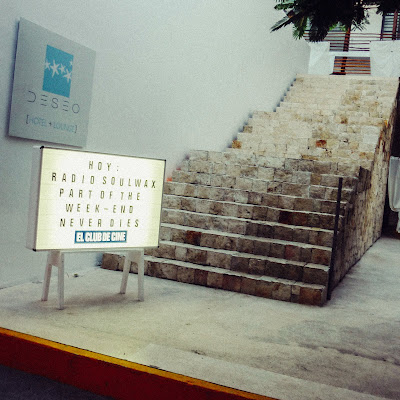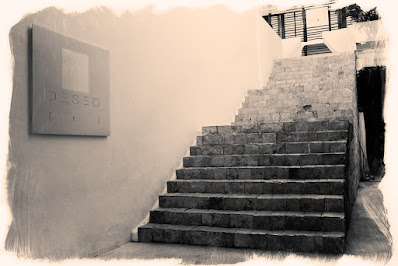You can tell exactly what Michael Rowe is trying to achieve here, and the fact that he stumbles leaves one almost as fundamentally frustrated at the conclusion as his protagonist.
The location and the situation are both promising, though the director is immediately working too hard to extract some symbolic juice from the former.
A prize-winning novelist called Armando from CDMX undertakes a day trip to Altata in Sinaloa alongside his wife in order to visit an old university friend of hers plus her husband — a man called Neto, whom Armando barely recalls from a gathering four years previously.
Soon Neto and Armando have peeled away from their wives and are chatting like old buddies on the beach below the former's groundswell-threatened condo (set within a development beside the Pacific not entirely unlike Juan Gaviota here in Guatemala).
Neto's teenage daughter has a local 'morenita' friend from the village called Danyka that her father regards as potential trouble. Armando gets to meet her and while father and daughter frolic in the waves, allows himself to be gently manipulated by the 15-year-old into joining her on a tour of an abandoned, half-built hotel. She's a kite surfing champion, an avid reader of fine literature and, she claims, a budding novelist herself.
So, that's the set up. If what follows is to touch us in any meaningful way, the part between it and the moment Armando's wife hands him back his copy of Hesse's Siddharta needs to be implemented with greater care overall.
It doesn't help that the the casting is just a little bit out. Both Damián Bichir and Sasha González are playing characters perhaps significantly younger than they themselves are and the poster rather cynically makes them appear more youthful than either does in the movie itself.
The scene in this publicity shot never actually occurs in the movie.
Rowe is both writer and director and so unfortunately has given himself two opportunities to get each exchange between these new friends slightly wrong.
He's turned poor Armando into a crashing boor, whose contributions to the dialogue are at times borderline scene-killing. Danyka works better as a character, yet also comes across as a bit too mumbly and hesitant.
It strikes me that Rowe needed to emulate Richard Linklater more here i.e. the words exchanged between Armando and Danyka should have echoed the smart repartee of Jesse and Céline in Before Sunrise, revealing to both the characters — and to us, the voyeuristic viewers — that a surprising chemistry had quickly been established, a thrilling yet disconcerting connection transcending both age and lifestyle.
The reckoning within the movie comes along with the aforementioned scene when Armando gets his book back — the moment that he realises that it really was all just a fleeting moment and that the way he chose to play it signifies that he will probably be plagued forever by a sense of regret (which he can surely only regret).
His internal narrative bifurcates right here and will never be the same.
Ultimately it is this sense of existential dissatisfaction after the passing of a moment of dangerous possibility that provides the payload of this coming of (middle) age tale. For it is the relative absence of such moments that defines the latter part of most lives.
That for Danyka herself it would have been little more than a moment is made clear by the way she seems to pointedly neglect Armando and his novel the instant she spots young Rafa approaching along the beach.
Armando on the other hand, appears unable to accept the proffered opportunity for a throwaway incident that he can quickly move on from, and soon finds that he's thrown it away completely in his failure to lay down the basis for something longer term.
In effect the novelist was psyched by the fantasy rather than the fulfilment of it and was thus found angling for a way to apply it to his humdrum existence in a more lasting form.
I've since reflected that this tale might have worked better if the characters had been closer in age, say a late-teenaged girl and a youngish novelist of around 28. The awkward Lolita tropes are actually a distraction here and have clearly prevented Rowe from making this connection seem appropriately plausible.
On the subject of credibility: if you pen lines like this and wish your viewers to believe your characters have arrived at a permanently deserted stretch of beach, please do something about all the footprints...

Most of us get to stage in life where we are carrying a handful of these what might have been misgivings. And in the majority of cases they are of course far less explicitly April-October than here.
I myself have one that now comes readily to mind. I was 17, in Portugal and had just made the acquaintance of a really stunning girl from Birmingham of the same age. Yet I soon discovered that it was with her sister, 23 and a Cambridge Graduate (as I then one day aspired so deeply to be), with whom the spark of a slightly more hazardous and exhilarating connection was starting to flicker.
Moments for making a choice presented themselves and I either clumsily ignored them or made what later seemed to be the wrong one.
Subsequently in London, I then tried to reverse that choice, yet it turned out that the oceanside location had been absolutely fundamental to the dazzling possibility, which had since dimmed for both.





































